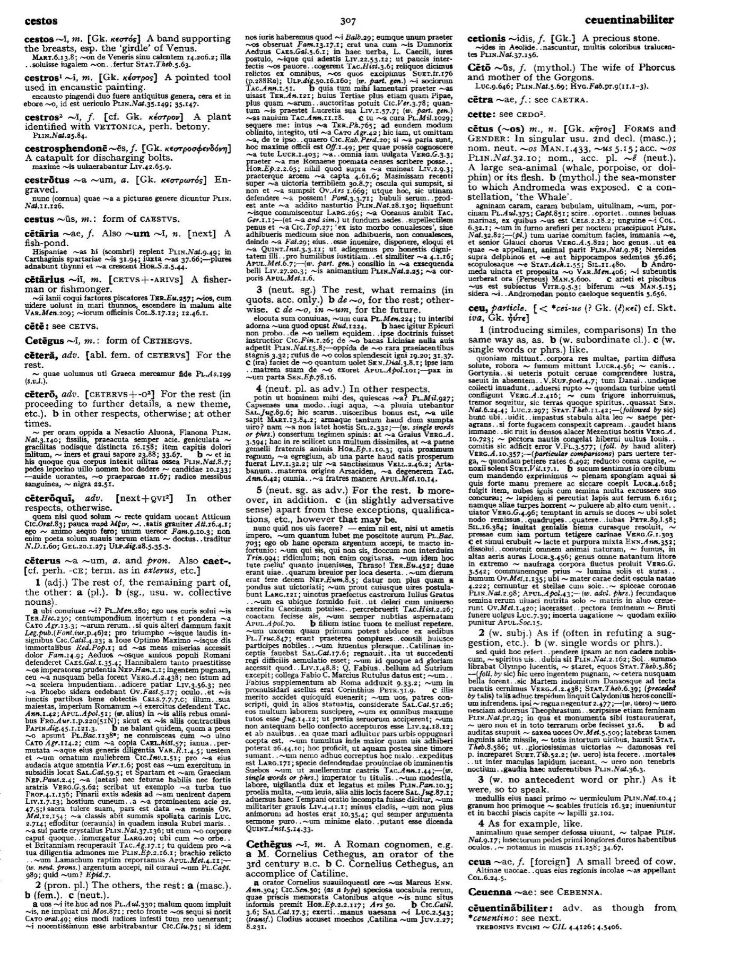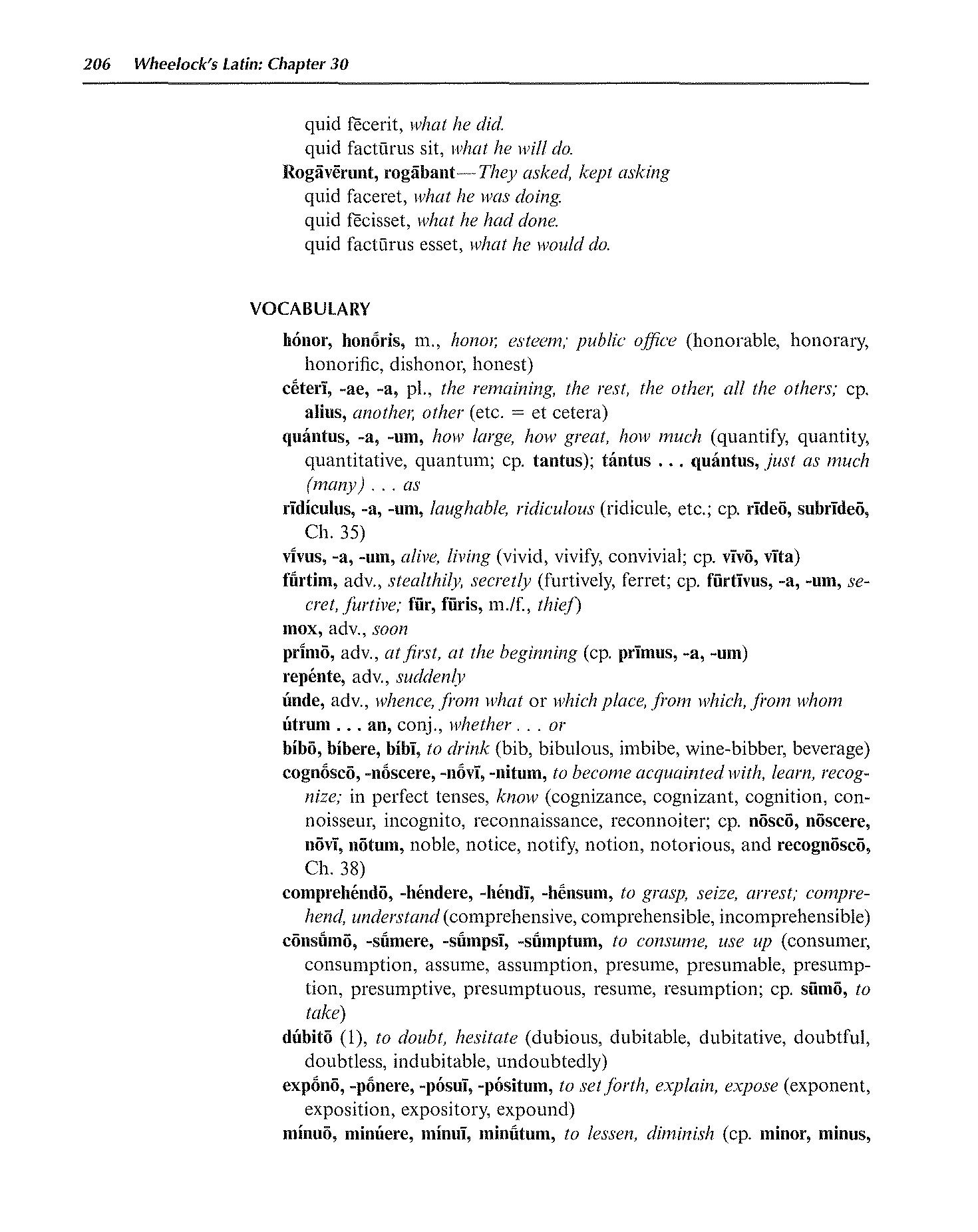
page_listing.tpl
page_subListingDetails.tpl
sub_listingDetails_style1.tpl
sub_listingDetails.title.tpl
cēterī (pl. of cēterus) the rest
cēterī (pl. of cēterus) is a Latin Adjective that primarily means the rest.
Definitions for cēterī (pl. of cēterus)
Wheelock's Latin
Adjective
- 1
pl., the remaining, the rest, the other, all the others
- 2
cp. alius, another, other
English derivatives:
etc = et cetera
Oxford Latin Dictionary
Pronoun
- 1
(pron. pl.) The others, the rest: (a) masc.). (b) (fem.). (c) (neut.).
Adverb
- 1
(neut. pl. as adv.) In other respects.
- 2
(neut. sg. as adv.) For the rest. (b) moreover, in addition. (c) (in slightly adversative sense) apart from these exceptions, qualifications, etc., however that may be.
Adjective
- 1
(adj.) The rest of, the remaining part of, the other: (a) (pl.). (b) (sg., usu. w. collective nouns).
- 2
(neut. sg.) The rest, what remains (in quots. acc. only). (b) de ~o, for the rest; otherwise. (c) de ~o, in ~um, for the future.
Sentences with cēterī (pl. of cēterus)
Latin to English
Ōrātor rogāvit cūr cēterī cīvēs haec cōnsilia nōn cognōvissent.Compare The orator asked why the other citizens had not learned these plans.
Ducī nūntiāvimus in quam terram cēterī mīlitēs fugerent (fūgissent). Compare We announced to the leader into what land the other soldiers were fleeing (had fled).
Cum cognōvisset quanta beneficia cēterī trēs offerent, ipse aequa beneficia obtulit.Compare When he had learned what great benefits the other three men were offering, he himself offered equal benefits.
Permitte divis cetera.Compare Leave all else to the gods.
Cetera multitudo sors, decimus quisque, ad supplicium ego.Compare The rest of the multitude were chosen by lot, every tenth man, for punishment.
Nullus est in res publica causa meus proprius; tempus vero ago sum magis ego proprius quam ceteriCompare There is no interest in the republic exclusively my own; but the time of action belonged more peculiarly to me than to the rest.
Data sources
Notes
- Definitions
- Frederick M. Wheelock, Wheelock's Latin, 6th ed., rev. Richard A. LaFleur (New York, NY: HarperCollins Publishers, 2005): 206.
- P. G. W. Glare, Oxford Latin Dictionary, Vols. 1-8 (Oxford: Clarendon Press, 1982): 307.
- Word frequencies
- Christopher Francese, "Latin Core Vocabulary," Dickinson College Commentaries, last modified 2014, http://dcc.dickinson.edu.
- Paul B. Diederich, The Frequency of Latin Words and Their Endings, PhD diss., (Columbia University, 1939).
- Louis Delatte, Suzanne Govaerts, Joseph Denooz, and Etienne Evrard, Dictionnaire fréquentiel et index inverse de la langue latine [Frequency Dictionary and Inverse Index of the Latin Language] (Liège, Belgium: Laboratoire d'analyse statistique des langues anciennes de l'Université de Liège [L.A.S.L.A.], 1981): 122.
Bibliography
Allen, Joseph H. Allen and Greenough's New Latin Grammar for Schools and Colleges: Founded on Comparative Grammar. Edited by James B. Greenough, George L. Kittredge, Albert A. Howard, and Benjamin L. D'Ooge. Boston, MA: Ginn & Company, 1903.
Crystal, David. A Dictionary of Linguistics and Phonetics. 6th ed. Oxford, UK: Blackwell Publishing, 2008.
Delatte, Louis, Suzanne Govaerts, Joseph Denooz, and Etienne Evrard. Dictionnaire fréquentiel et index inverse de la langue latine [Frequency Dictionary and Inverse Index of the Latin Language]. Liège, Belgium: Laboratoire d'analyse statistique des langues anciennes de l'Université de Liège (L.A.S.L.A.), 1981.
Diederich, Paul B. The Frequency of Latin Words and Their Endings. PhD diss., Columbia University, 1939.
Francese, Christopher. "Latin Core Vocabulary." Dickinson College Commentaries. Last modified 2014. http://dcc.dickinson.edu/latin-vocabulary-list.
Gildersleeve, Basil L., and Gonzales Lodge. Gildersleeve's Latin Grammar: Third Edition, Revised, and Enlarged. 3rd ed. London, England: Macmillan and Co., 1903.
Glare, Peter G.W. Oxford Latin Dictionary. Vols. 1-8. Oxford, England: Clarendon Press, 1982.
Krüger, Bernd. "Latin Conjugation Tables." Cactus2000. Accessed May 5, 2023. https://latin.cactus2000.de/index.en.php.
Pierson, Nick. "Sound of Text." Accessed October 26, 2019. https://soundoftext.com.
Wheelock, Frederick M. Wheelock's Latin. 6th ed. Revised by Richard A. LaFleur. New York, NY: HarperCollins Publishers, 2005.
Wiktionary Contributors. "Victionarium." Wikimedia Foundation, Inc. Updated March 18, 2019. https://la.wiktionary.org/wiki/Victionarium:Pagina_prima.
Citation
Chicago (17th ed.)
Allo Contributors. "cēterī, cēterae, cētera (adj.) - Latin Word Definition." Allo Latin Dictionary. Last modified . Accessed February 19, 2026. http://ancientlanguages.org/latin/dictionary/ceteri-ceterae-cetera.
Entry created on . Last updated on .







